Meeting the Urgent Needs of Ukrainian Schools
As the fight against Russian aggression continues, so does the battle to reverse educational gaps and bring children back to school.
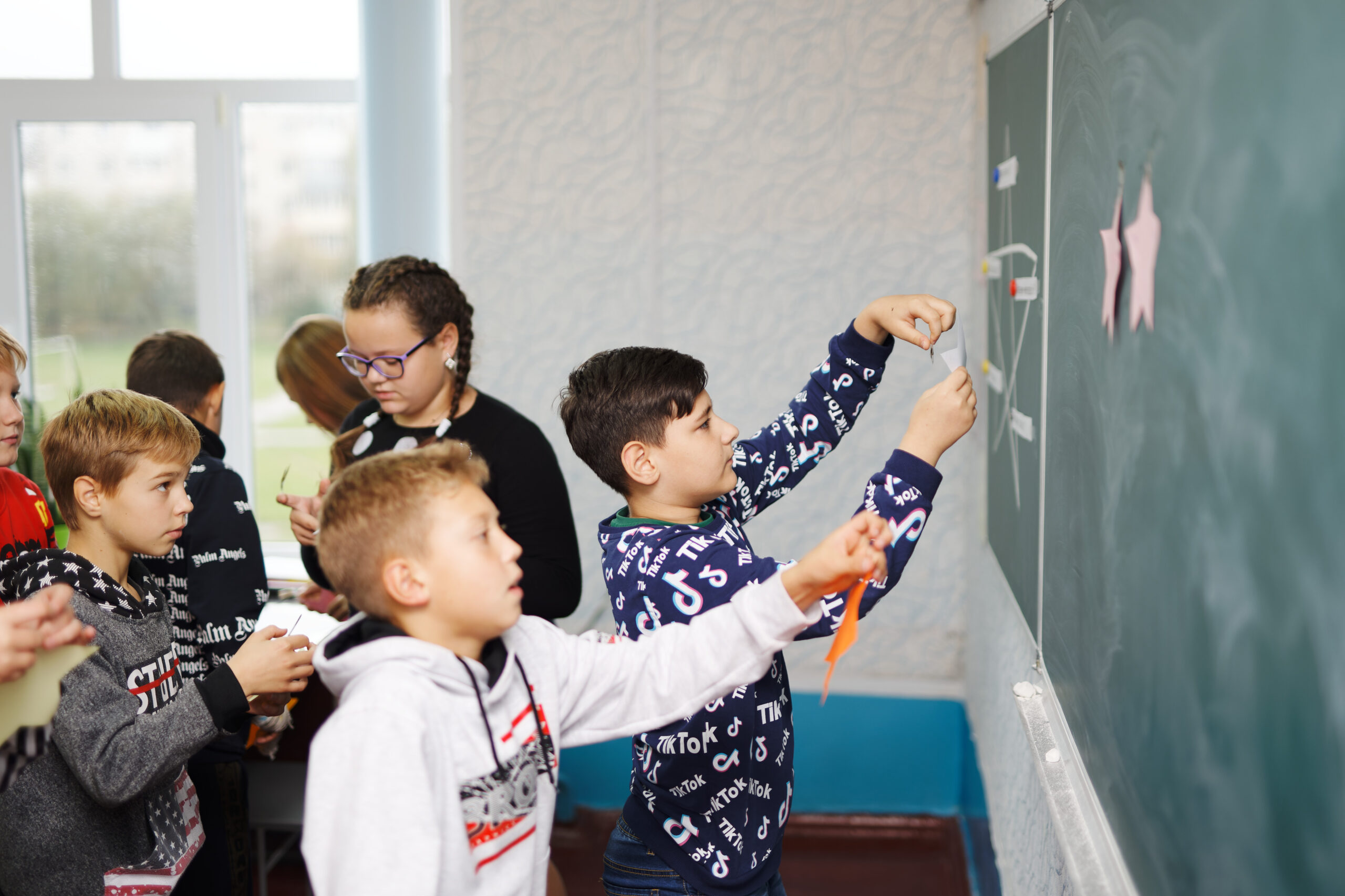
Three years into Russia’s full-scale war, Ukraine’s education system is under severe strain. Damaged school buildings and frequent air-raid sirens have caused serious disruptions in education, leading to troubling learning gaps. Students and staff alike face burnout, high blood pressure, and anxiety. Responding to urgent needs from the ground, the European Wergeland Centre is launching a new three-year cycle to support Ukrainian educators and school staff.
“I’m originally from Bakhmut, but the city no longer exists,” says Ihor Haievyi, Headmaster at the Bakhmut Vocational and Technical Education Centre.
The Russian assault on Bakhmut started in July 2022 and ended only after ten months of fighting – the bloodiest battle so far in the Russian war of aggression against Ukraine. By then Ihor had escaped to Western Ukraine, taking with him as much of the school’s tools and supplies as possible.
“I managed to relocate the equipment from Bakhmut during the siege to Rivne, and now we are receiving support from EU and the Ukrainian Government. But many of our students are abroad, and in Ukraine some are studying online, others face-to-face,” he explains.
SHARING UKRAINIAN REALITIES: Ihor Haievyi, Headmaster at Bakhmut Vocational and Technical Education Centre, Inna Ivanyuk, Headmistress at Law Lyceum No. 2 in Ternopil, and Antonina Kharchenko, Headmistress at Lyceum No. 15 in Chernihiv visited EWC in March 2025.
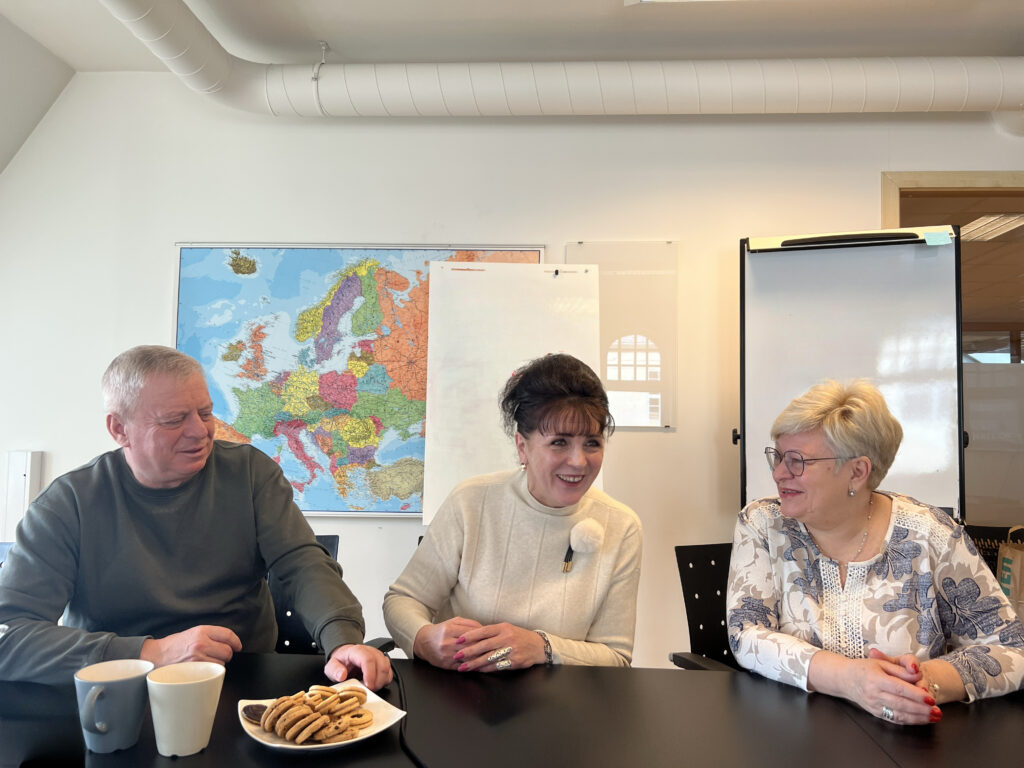
“Once they return to the classrooms, the alarm goes off again. And again, and again”
This is not unique to Ihor’s school. Russia’s full-scale invasion has scattered Ukrainian children all over the world. Both outside and inside the country, many students receive their education online. Frequent attacks on educational facilities and a lack of bomb shelters forced the Ukrainian government to close schools only a few months after they reopened following the COVID-19 pandemic.
“Our school is big. We have 1500 students split into 40 different classes, but ourt bomb shelter can only fit half of them, says Antonina Kharchenko, Headmistress at Lyceum No. 15 in Chernihiv in Northern Ukraine.
“That’s why we have to offer morning and night shifts. The bomb shelter is well equipped and has access to bathrooms, so we are very happy with that. But sometimes the air raid alarm goes off several times a day. We then have to sit in the shelter for several hours – 750 children all packed together. Once they return to the classrooms, the alarm goes off again. And again, and again. This continues throughout the day.”
UNDERGROUND REFUGE: Sheltering underground has become routine for Ukrainians since the start of Russia’s full-scale aggression in 2022. Here from an improvised shelter in Irpin. Rasal Hague/Wikimedia Commons
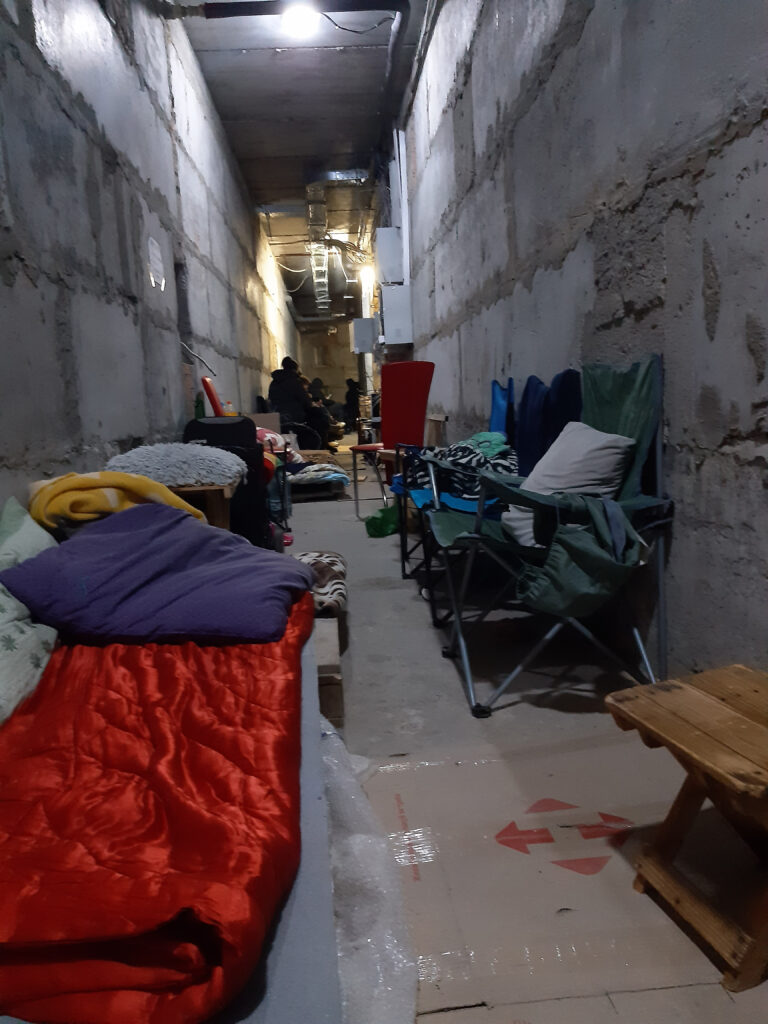
Headmaster Ihor Haievyi is on a study visit to Norway alongside his colleagues Inna Ivanyuk and Antonina Kharchenko as part of the European Wergeland Centre’s “Schools for Democracy” Programme – a ten-year running project that works to promote democratic reforms in Ukraine’s educational sector.
Fighting every day to ensure their students’ right to an education, the three colleagues have many things in common and are willing to share their experiences with the European Wergeland Centre, helping the Centre understand the realities of war and what students and school staff in Ukraine are going through.
The School Heads were welcomed at the EWC office in Oslo by Iryna Sabor, Head of the Early Childhood and School Section and leader of the “Schools for Democracy” Programme.
“When the children can’t go to school because of the fear or airstrikes, they need to follow the classes digitally from home. That means that their parents can’t go to work. They need to stay at home to look after their children. When the Government also reports of a significant deterioration of social and academic skills among Ukrainian students, they want to see children back at school and parents back at work,” explains Iryna.
Since the “Schools for Democracy” Programme was renewed with financial support from the Nansen Support Programme for Ukraine at the end of 2024, Iryna and her colleagues have been very busy planning for EWC’s continued work to strengthen the Ukrainian school sector amidst Russia’s continued onslaught.
PHOTO: Iryna Sabor, Head of the Early Childhood and School Section at the European Wergeland Centre
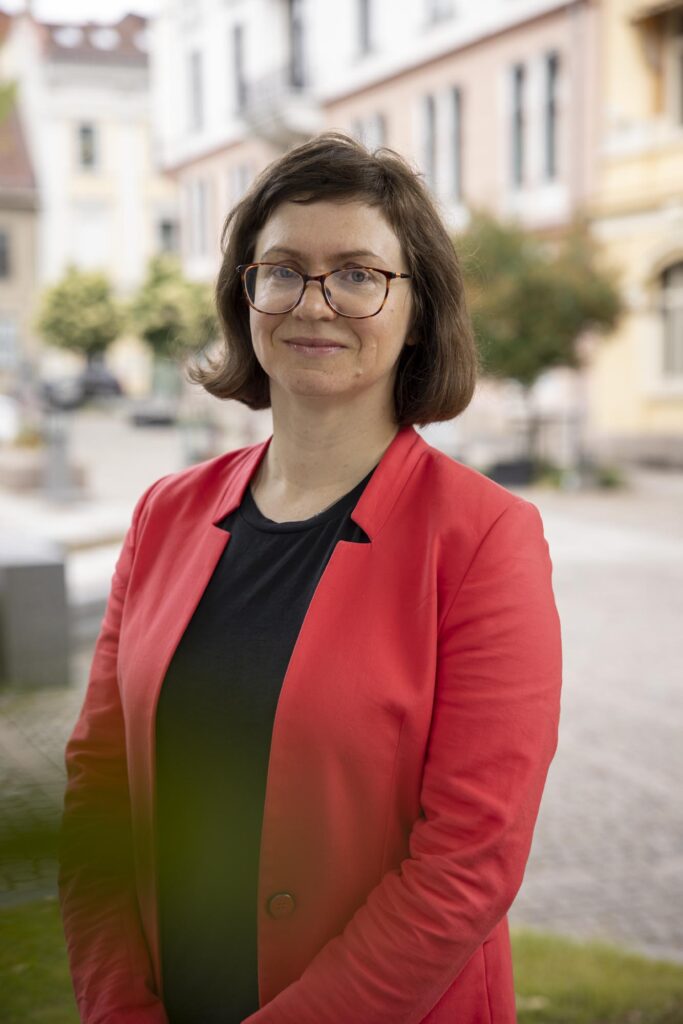

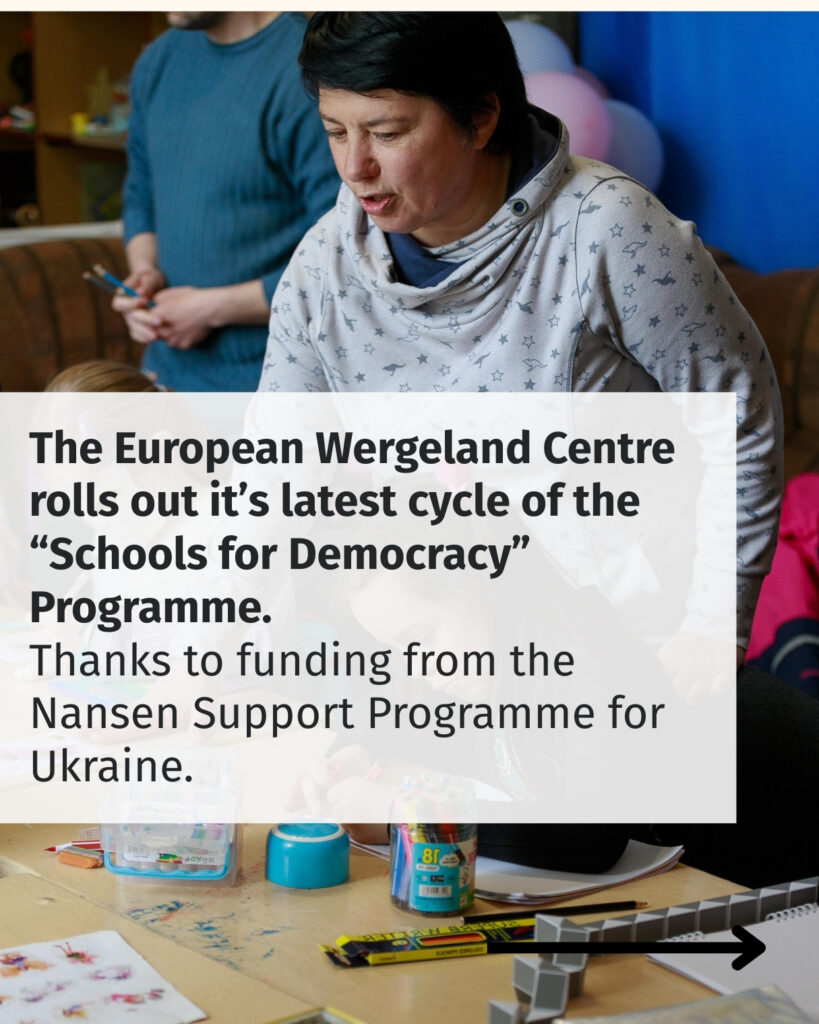
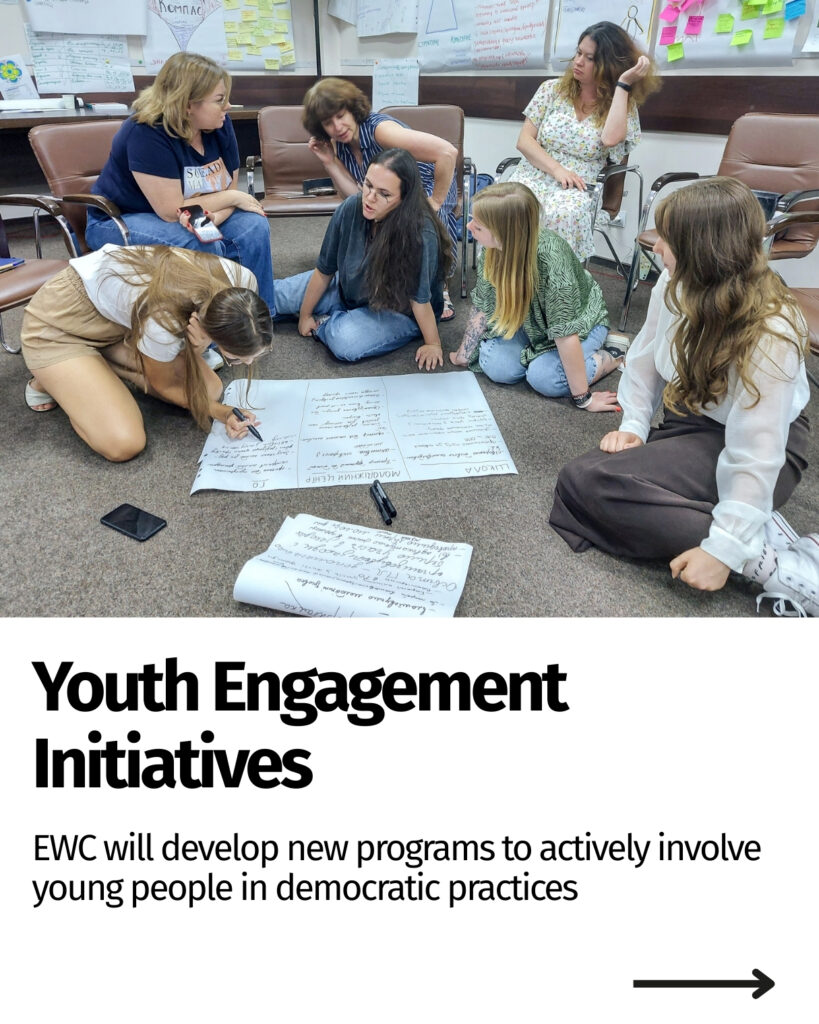

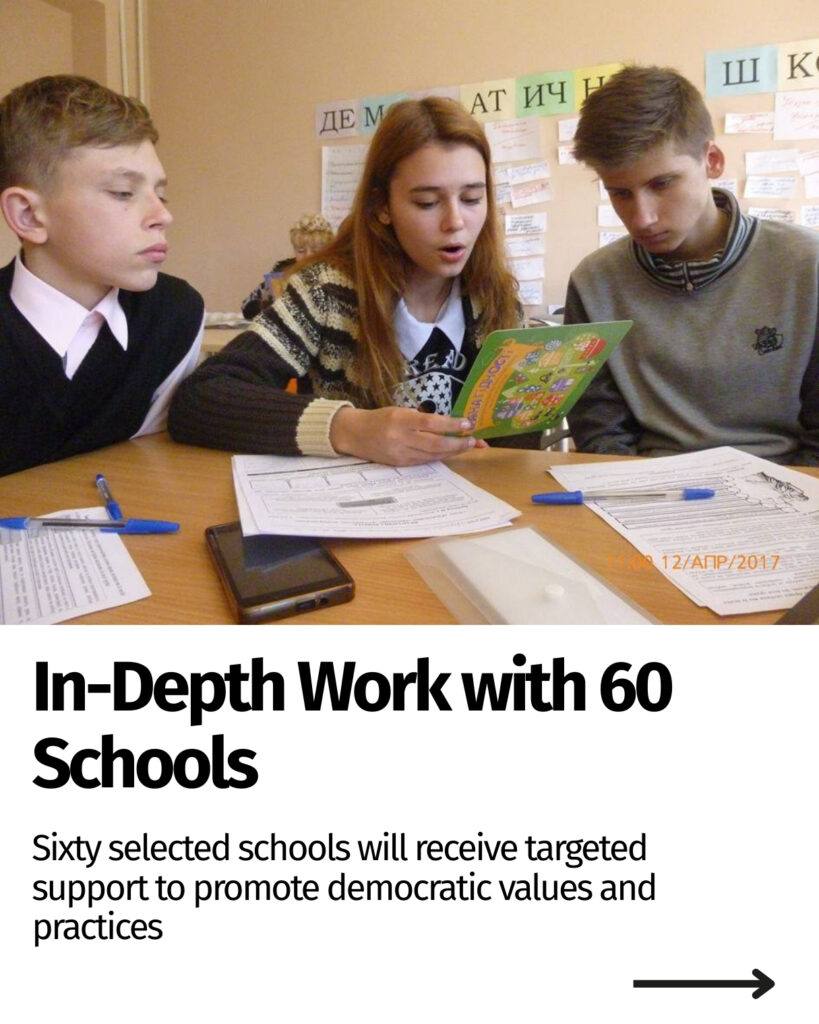

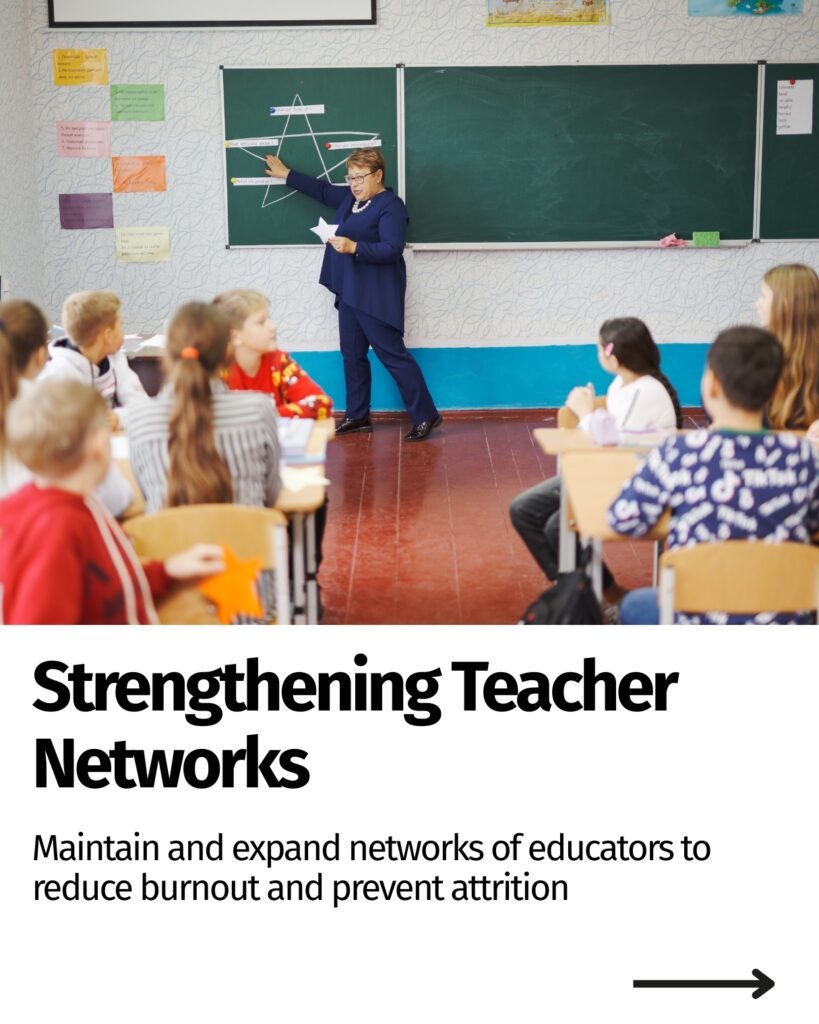
”Schools for Democracy” is the Centre’s biggest and longest-running project. So far, 140 000 teachers have have been trained through the Programme’s online courses. 300 schools and over 50 kindergartens have so far taken part in the project.
Its latest cycle was launched in 2025.
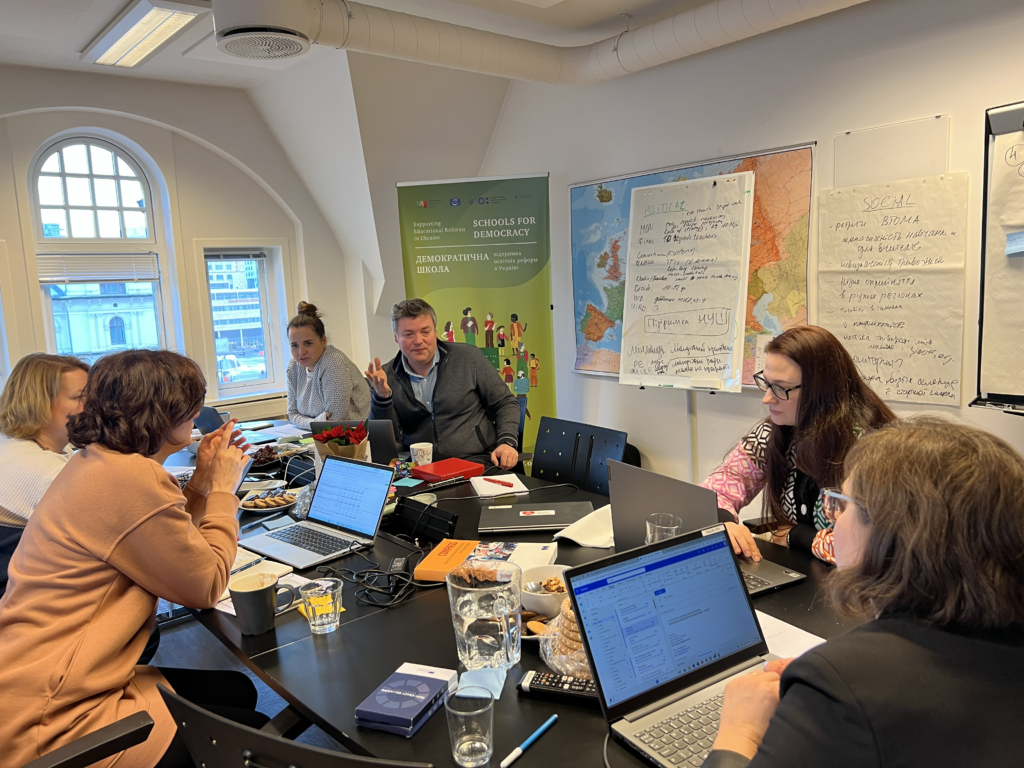
Children suffer from poor mental health
Three years into Russia’s full-scale war, schools in Ukraine are under significant strain. According to numbers from UNICEF, four million children have had their education interrupted due to the war.
The emotional and psychological toll on children is profound. Reports show that more than 70 percent of children feel unsafe or fearful, while over half experience sadness and low self-esteem. Educators are also under strain, with 80 percent reporting anxiety and stress, further complicating efforts to deliver quality education.
“We see that children are suffering from poor mental health,” says Antonia. “The children are experiencing very unusual illnesses compared to the children who grew up in peacetime. They suffer from high blood pressure, sometimes as high as 160/90. They tremble and cannot control themselves. Some children always refuse to go down into the bomb shelter. They stay on the first floor between two walls with the school nurse.”
Inna Ivanyuk, Headmistress at Law Lyceum No. 2 in Ternopil, sees a difference in those fleeing the fighting in the east and the south, and those living in Western Ukraine. Her secondary school, located about a two-hour drive from the Polish border has welcomed many students from Odesa, Luhansk, Donetsk, Mykolaiv and Zaporizhzhia.
“The children who are internally displaced are more closed in,” she says. “Especially those coming from the frontline regions – many of them didn’t smile for six months. They needed rehabilitation and psychological support to open up. Ukrainian children these days are more responsible and adult-like. They want to help out and assist the army in any way they can. They are not relaxed in the same way children used to be.”
Even though Ihor’s school has relocated to an area in Ukraine widely recognized to be the safest in the country, both he and the students are still interrupted by frequent air-raid sirens.
“Since it’s a vocational school, many students live in dormitories. Often the air-raid sirens will sound off at night and then again at the morning. The children need to go to the bomb shelter twice in one night, and it is very exhausting,” he says.
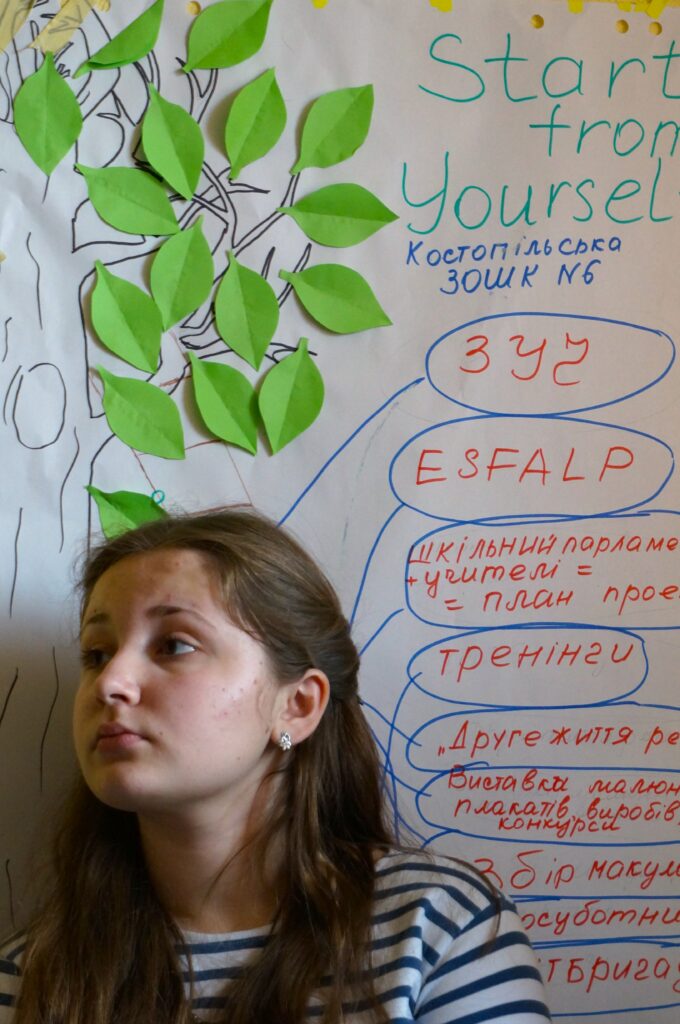
Bakhmut has been the scene of the most intense fight of the ongoing war in Ukraine. Once the home of more than 70 000 people, the city has been turned to complete rubble and is now under Russian occupation.
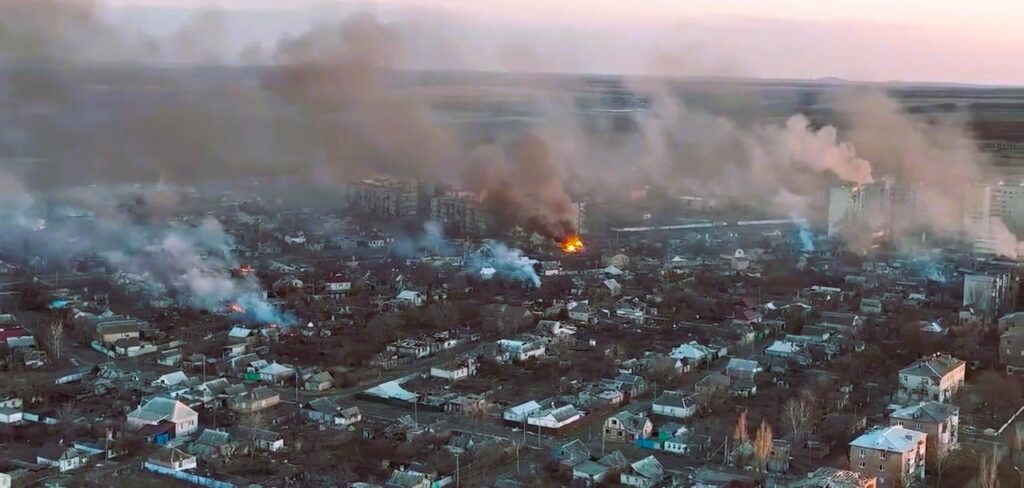
Children are growing up much faster than before the war
The war, combined with the effects of the COVID-19 pandemic, have led to concerning levels in learning gaps, especially among younger and students living in rural areas. According to PISA numbers from 2022, Ukrainian 15-year-olds score significantly less than the average among OECD countries in both reading skills, mathematics and science.
“We of course register that their performance is going down, and the knowledge is not as good as it once was,” says Antonina. “We have a special programme to reduce the learning gap, where the children study extra during the evening, but we need more financial support and equipment. Especially for learning foreign language, maths and reading. And there is a lot of pressure on the teachers, because they need to work more to close the learning gaps. As Headmistress I try to motivate them as much as we can.”
“There is a lot of pressure on Ukrainian teachers”
After the launch of Russia’s full-scale invasion, the European Wergeland Centre adjusted all its online courses to the war situation, updating them with components on psychological support and stress management. Luckily, the COVID pandemic had forced the EWC Ukraine team to make all resources available online, making them accessible all over the country.
However, over three years of full-scale war have taken its toll on Ukrainian educators. Many have had to relocate, becoming internally displaced in parts of the country considered to be safer than Eastern and Southern regions. Teachers report on stagnant wages, long working hours, a struggle to motivate their students, feelings on exhaustion and anxiety – as well as the added burden of volunteer work – something many Ukrainians of all professions engage in.
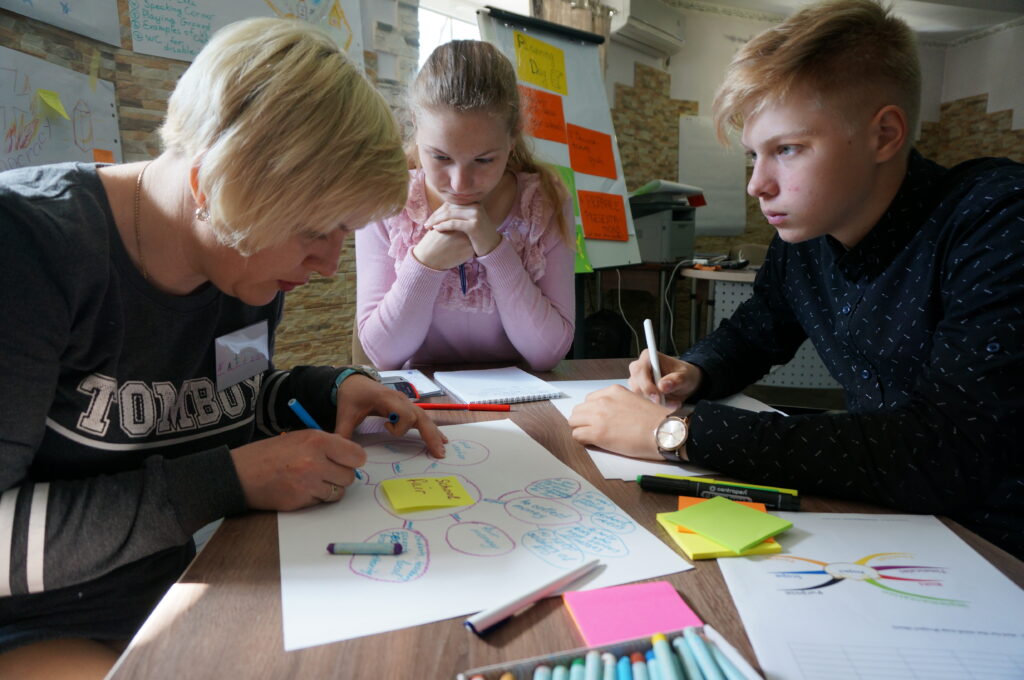
“There is a lot of pressure on Ukrainian teachers and many experience burnout,” explains Ihor. “The children need more support and attention than during peacetime, and that adds to the burden the teachers must carry.”
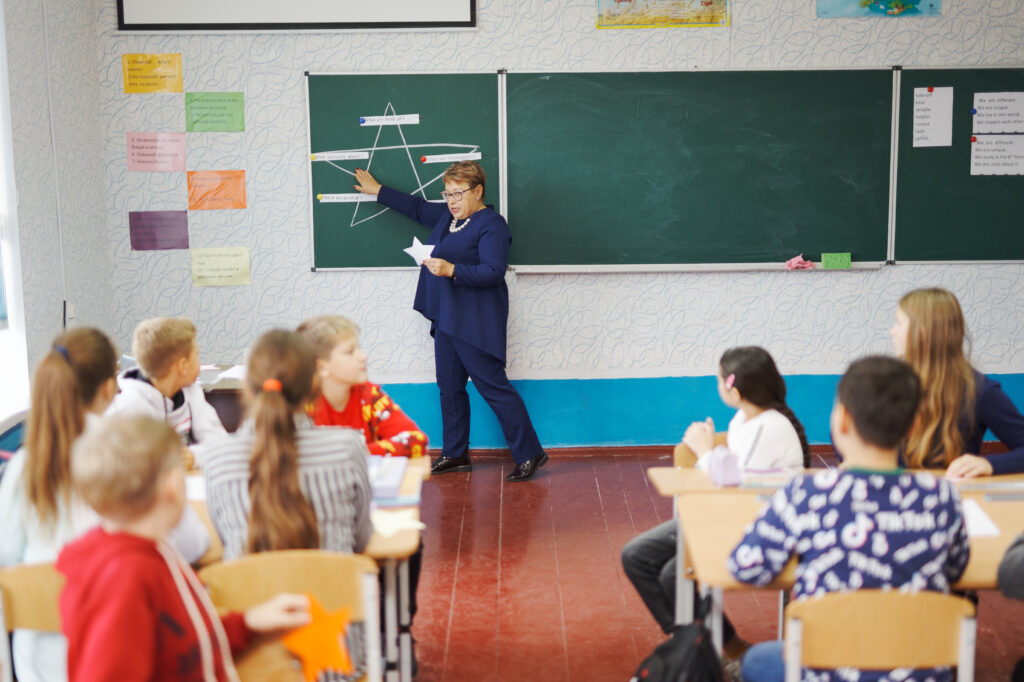
“Still, they are able to deliver quality education because of how dedicated they are to their profession. They do everything they can to keep up the quality in these very hard times for our country,” he says proudly.
“The reason why we work so hard, is because we really want to keep children in Ukraine,” Antonina chimes in. “We were a part of the “Schools for Democracy” Programme before the war, partaking in webinars and trainings. We need to help our teachers gain new skills, because they need to be very careful with our children, weighing their words, because a child may sit in class and then suddenly burst into tears. We need training in how to support them.”
Ukrainian children continues to pay a high price for the aggression of the Russian Federation.
More than 3,790 educational facilities have been damaged or destroyed since the start of the full-scale invasion, according to the Ukrainian government.
WARTIME CHILDHOOD: A destroyed school in Kharkiv. PHOTO: Wikimedia Commons
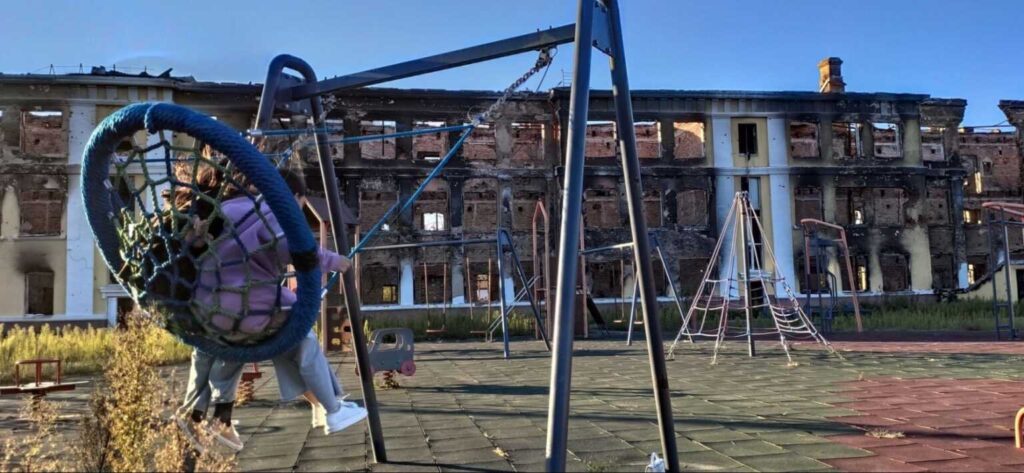
Aiming to break apart the old hierarchical structure
Listening to the experiences of School Heads like Ihor, Antonina and Inna, and working in close relationship with the Ukrainian Government, especially the Ukrainian Institute for Educational Development, the plans for the European Wergeland Centre’s next three-year cycle are ready:
The Centre will develop different youth engagement initiatives, strengthen the capacities of kindergarten teachers, and work in depth with 60 schools to promote democratic practices. A specialised training programme will be offered to the Heads of the schools, in part inspired by Norwegian experiences on how to work with democratic citizenship to create an atmosphere of inclusion and participation.
“We also want to keep up the network of teachers, in order to avoid burnout and teachers leaving the profession,” explains Iryna. “The war has raged for a long time and people are tired. We want to break apart the old hierarchical structure and encourage educators support each other, seek advice from colleagues and learn together.”
“We need to learn from each other”
As guardians of their country’s greatest resource, Ihor, Antonina and Inna look toward the future.
They hope for closer cooperation with other European countries, and that the students they only are able to see on a screen at the moment, will return to Ukraine.
“We have children in online classes from all over the word, including Norway. Not everyone will come back but it is very important for us that as many as possible will return. The ones that are studying online in our school are saying that they miss Ukraine so much that they want to return home,” Antonina smiles.
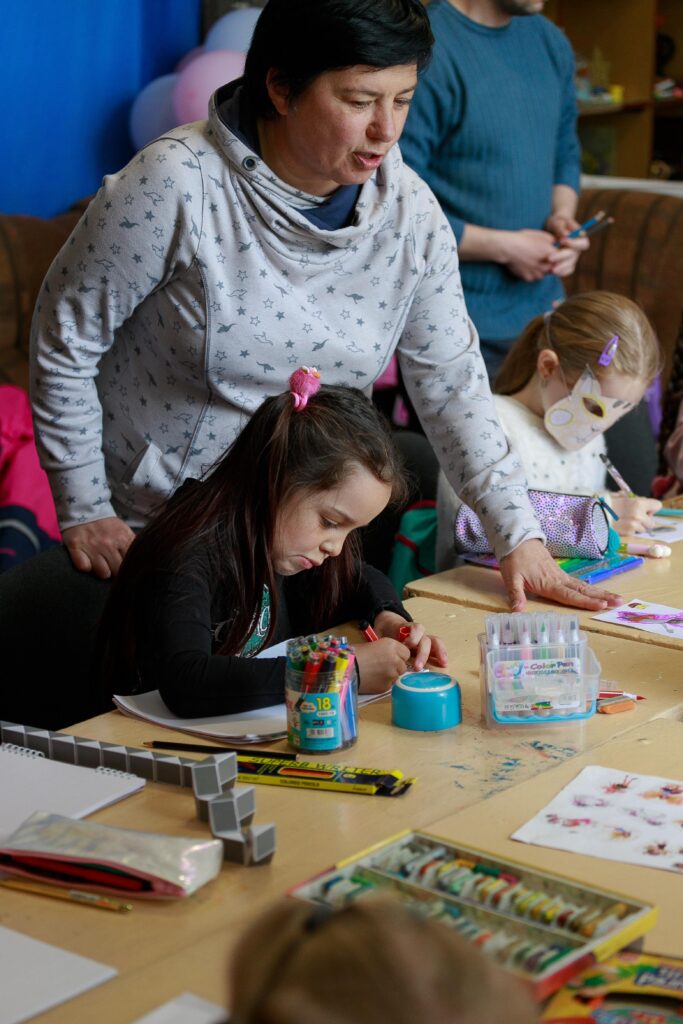
According to Oksen Lisovyi, Minister of Education and Science of Ukraine, 400,000 school children are now located outside of Ukraine’s borders. Ihor hopes that they will bring with them everything they have learnt while staying in their host countries.
“All the children want to have peace and to see Ukraine as a European country. They have seen the difference in what is coming from the East, and who are helping our country in the West. The children that have remained in Ukraine have experienced it on their own skin, while the children living abroad have experienced democracy in practice, and I hope they will come back to Ukraine and live by these principles,” he says.
“We need to learn more from other teachers’ experiences,” Inna says passionately. “This will help us to grown and to develop. We need to open up more and speed up this process. We had very good exchange programmes before the war, and we are really missing this now. We want to be a part of the European market – not just in a business sense – but in a spiritual sense. We need to learn from each other.”
RESPONDING TO UKRAINE’S NEEDS: The Ukrainian School Heads, members of the EWC Ukraine team, alongside Raisa Yevtushenko and Larysa Fitsaylo from the Ministry of Education of Ukraine, Andrii Matat and Nataliia Stupnytska from OSCE Office in Ukraine
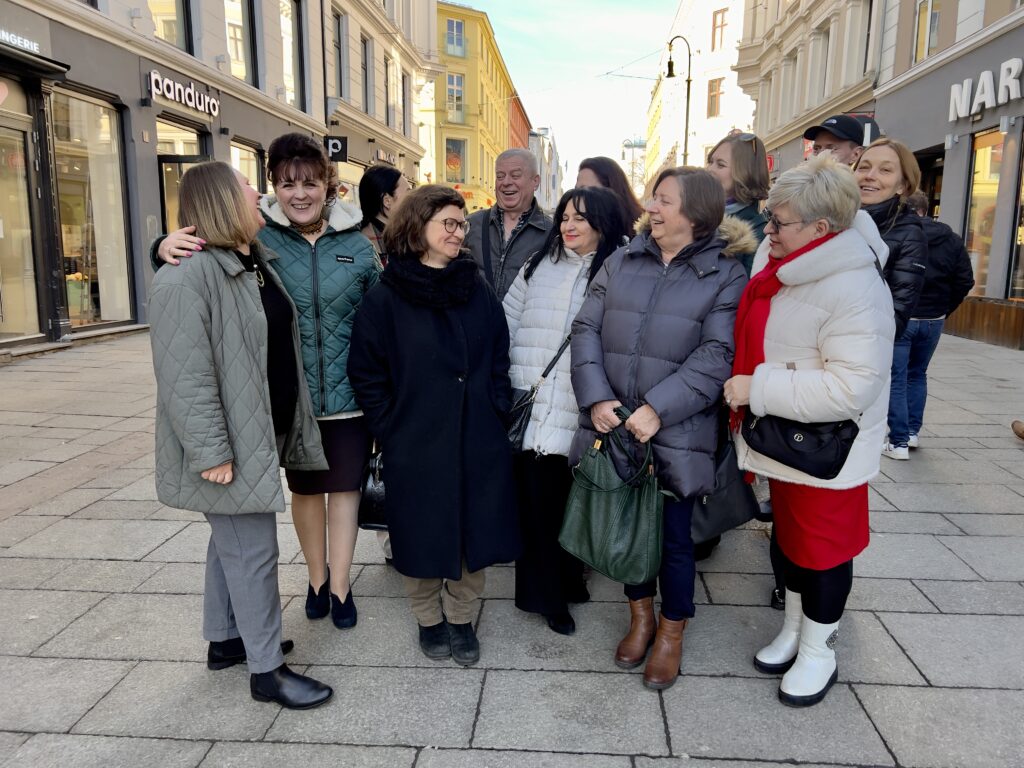
The “Schools for Democracy” Programme is implemented by the EWC in cooperation with the Ministry of Education and Science of Ukraine, Center of Education Initiatives, Step by Step Foundation Ukraine and SavED. The programme is funded by the Nansen Support Programme for Ukraine. The Nansen Programme belongs to the Norwegian Agency for Development Cooperation (NORAD).
Visit the programme website at https://www.schools-for-democracy.org/ or https://theewc.org/countries/ukraine/